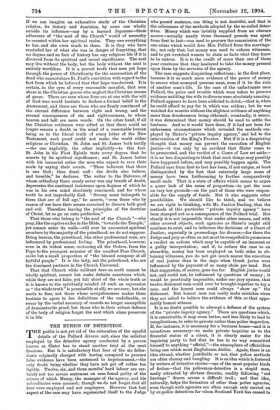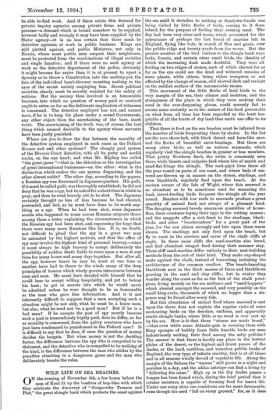T HE public is not yet rid of the reiteration of
the squalid details of the Pollard divorce suit, since the solicitor employed by the detective agency conducted by a person known as Slater has to stand another trial at the next Sessions. But it is satisfactory that four of the six defen- dants originally charged with having conspired to procure false' evidence have been sentenced to imprisonment,—the only doubt being whether they have not got of rather too lightly. Twelve, six, and three months' hard labour are cer- tainly not too severe sentences on men found guilty of the crimes of which Henry, the manager of the agency, and his subordinates were accused; though we do not forget that all four were employed and not employers. However that last 'aspect of the case may have represented- itself to the Judge who passed sentence, one thing is not doubtful, and that is the odiousness of the methods adopted by the so-called detec- tives. Money which was lavishly supplied from an obscure source—actually nearly three thousand pounds was, spent from first to last—was used to procure the commission of the one crime which would free Mrs. Pollard from the marriage- tie ; not only that, but money was used to suborn witnesses, and to get wretched women to state as facts what they knew to be untrue. It is to the credit of more than one of these poor creatures that they hesitated to take the money pressed upon them by the servants of the agency.
The case suggests disquieting reflections ; in the first place, because it is so much more evidence of the power of money to secure what moneyed persons want, even if it be the ruin of another man's life. In the case of the unfortunate man Pollard, the pains and trouble which were taken to procure evidence entitling the wife to divorce were absolutely amazing. Pollard appears to have been addicted to drink,—that is, when he could afford to pay for it, which was seldom; but he was watched for months without the slightest evidence of anything more than drunkenness being obtained; eventually, it seems, it was determined that money should be used to settle the business. And so it would have done, if it had not been for unforeseen circumstances which revealed the methods em- ployed by Slater's "private inquiry agency," and led to the intervention of the King's Proctor. But if it is a disquieting thought that money can pervert the execution of English justice—it was only by an accident that Slater came to be prosecuted, and the verdict of a Court of Law set aside— it is no less disquieting to think that such things may possibly have happened before, and may possibly happen again. The Pollard case from first to last has been, if not unique, at least distinguished by the fact that extremely large sums of money have been forthcoming to further comparatively small ends. That is a state of affairs which seems to argue a queer lack of the sense of proportion—to put the case on very low grounds—on the part of those who were respon- sible for the supply of funds. But it also suggests other possibilities. We should like to think, and we believe we are right in thinking, with Mr. Justice Darling, that the methods of this particular "private inquiry agency" have been stamped out as a consequence of the Pollard trial. But clearly it is not impossible that under other names, and with other avowed objects, such agencies as Slater's might still continue to exist, and to influence the decisions of a Court of Justice ; especially in proceedings for divorce,—for there the Judge and jury as often as not must be compelled to pronounce a verdict on actions which may be capable of an innocent or a guilty interpretation; and if, to reduce the case to an absurdity, money has been employed on both sides in ob- taining witnesses, you do not get much nearer the execution of real justice than in the days when Greek juries were influenced by the payment of so many obols per head. But that suggestion, of course, goes too far. English juries would not, and could not, be influenced by questions of money ; it would be practically impossible, under our jury system, that twelve dishonest men could ever be brought together to try a case, and the honest men could always " show up " the dishonest. But honest men can easily make mistakes when they are asked to believe the evidence of this or that appa- rently honest witness.
It is no doubt possible to attempt a defence of the system of the " private inquiry agency." There are questions which, it is conceivable, it may seem better, and less likely to lead to complications, to refer to private rather than police inspection. If, for instance, it is necessary for a business house—and it is sometimes necessary—to make private inquiries as to the financial status of a client, it is clearly easier for the inquiring party to feel that he has in no way committed himself to anything "official,"—the atmosphere of officialdom being one which most Englishmen dislike. Again, there is an idea abroad, whether justifiable or not, that police methods are often clumsy and bungling. It is an idea which is fostered by writers of detective stories—one of the most popular kinds of fiction—that the policeman-detective is a stupid man, easily attracted by obvious theories, readily following "red herrings " 'drawn across a difficult trail ; and that idea, naturally, helps the formation of other than police agencies, even though such agencies are often enough only carried on by ex-police detectives for whom Scotland Yard• has ceased to be able to find work. And if there exists this demand for private inquiry agencies among private firms and private persons—a demand which is bound somehow to be supplied, however badly and wrongly it may have been supplied by the Slater agency—it is no less certain that there must be detective agencies at work in public business. Kings are still plotted against, and public Ministers, not only in Russia, where most public men suspect their neighbours, must be protected from the machinations of illegal societies and single fanatics ; and if there were no such agency at work as the detective department of the police, obviously it might become far easier than it is at present to upset a dynasty or to throw a Constitution into the melting-pot, the fate of the individual bomb-thrower counting nothing in the eyes of the secret society employing him. Secret political societies, clearly, must be secretly watched for the safety of nations. But the secrecy thus involved is an honourable business, into which no question of money paid or received ought to enter, so far as the deliberate implication of witnesses is concerned. The detective employed has not, and cannot have, if he is to keep his place under a sound Government, any other object than the ascertaining of the bare, stark truth. The ascertaining of the truth was, of course, the last thing which seemed desirable to the agency whose servants have been justly punished.
Where are you to draw the line between the morality of the detective system employed in such cases as the Pollard divorce suit and other systems? The cheaply paid system of the Divorce Court detective, with all its petty and sordid tricks, on the one hand ; and what Mr. Kipling has called "the great game "—that is, the detection or the investigation of great international businesses—on the other : what is the distinction which makes the one system disgusting, and the other almost noble? The other day, according to the papers, a Russian spy was discovered in Japanese quarters. His guilt, if it must be called guilt, was thoroughly established; he did not deny that he was a spy, but he asked for a short time in which to pray, and then he went bravely out to be shot. The Japanese certainly thought no less of him because he had cheated, pretended, and lied, as he must have done to be wortb any- thing as a spy. When he had been shot, some Japanese scouts who happened to come across Russian outposts threw among them a letter explaining the circumstances in which the Russian spy had been shot, and expressing the hope that there were many more Russians like him. It is, no doubt, not difficult to plead that the spy in a great war may be animated by the highest motives, and that the office of spy may involve the highest kind of personal bravery,—since it must always be high bravery to accept deliberately the possibility of sudden death liable to come upon a man at any time for many hours and many days together. But after all, the spy, however brave he may be, must at one time or another have had to throw to the winds many of the deep 'principles of honour which wisely govern intercourse between man and man. He must have decided with himself that he could bear to accept willing hospitality, and yet to betray his host; to get at secrets into which he would never be admitted unless he were thought to be as honourable as the man who gave him information. And is it not inherently difficult to suppose that a man accepting such a situation might be not only, what he must be, a brave man, but also, what he need not be, a good man ? But if he is a bad man? If he accepts the post of spy merely because such a post is tremendously highly paid, does he differ, so far as morality is concerned, from the paltry creatures who have just been condemned to punishment in the Pollard case? It is difficult to say that he does, if once the question of money 'decides the bargain. But when money is not the deciding factor, the difference between the spy who is compelled to be dishonest, and the detective who is compelled to be nothing of the kind, is the difference between the man who abides by the penalties attaching to a dangerous game and the man who deliberately breaks the rules.
WILD LIFE ON SEA BEACHES.











































 Previous page
Previous page